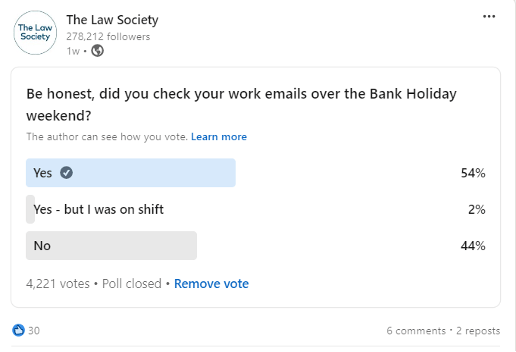Could a ‘right to switch off’ improve work-life balance for lawyers?

In August 2024, the Australian government introduced its own version of a right to disconnect rule.
Although it doesn’t ban employers from contacting people out-of-hours, it gives the employee the right to ignore emails and calls unless doing so is considered ‘unreasonable’. The system has some flexibility on how employers and employees implement it in practice.
The UK government has made clear it wants to address the work-life balance of the nation, following in the footsteps of administrations in Belgium and Ireland.
While it’s not yet clear if these intentions will make it into legislation, its pre-election party manifesto Make Work Pay stated:
“Good employers understand that for workers to stay motivated and resilient, they need to be able to ‘switch off’ and that a culture of presenteeism is damaging to morale and productivity… workers know that there are circumstances where their employer may need to contact them, and some value the ability to work outside of conventional work patterns.”
But how would this impact current working practices for legal professionals in firms, in-house and other organisations across the UK?
Sent from my brother’s wedding, please excuse typos
A recent poll of our LinkedIn community revealed over half of respondents admitted to checking emails over the August bank holiday weekend.
Latest research from LawCare found 65% of those surveyed checked emails regularly outside working hours.

“We know from previous working hours legislation it’s not as simple as putting a marker in a contract as there is, more often than not, an opt-out clause for employees” says Elizabeth Rimmer, chief executive at LawCare and former solicitor.
“The conversation should be around firms building a culture of trust and flexibility and respecting people’s choices about how they want to work, whether that’s late at night or taking time off to attend important events with the trust that work will still get done.”
But well-meaning business policies alone are not enough, says Elizabeth.
“If firms are serious about changing culture and setting policies for a healthier work-life balance, senior leaders must model the behaviour.
“A lawyer who receives an email at the weekend – whether they choose to reply – will be thinking about it until Monday morning.”
Recognition of a problem
Mila Trezza is a coach for lawyers, helping with professional development at all stages of their careers, drawing on her 20 years of experience as an international lawyer.
“Intervention at the government level could help validate that working non-stop does not enhance productivity and comes at a huge cost to society,” says Mila.
However, any new rules would need to be part of a broader set of measures – at the organisational, departmental and individual levels – to bring about meaningful change in the sector and its culture.
“Lawyers in managerial roles are rarely supported with adequate people management resources and training, and have often been managed by people who lacked it as well,” says Mila.
This is something LawCare has also picked up on through its conversations with the legal community.
“If you’re a good lawyer, you are promoted because you’re good at what you do. Then you find yourself with five people to manage alongside a billable hours target that doesn’t quite work,” says Elizabeth.
“It would be wiser to reduce the target so that leaders have more time to work with employees to ensure they are supported to deliver.”
While numerous resources are available to help individuals manage stress and burnout, a deeper cultural shift is essential for lawyers to develop the awareness needed to make positive changes in their day-to-day work life, Mila says.
“We often equate being busy with a sense of self-worth, and society tends to reward busyness over efficiency.
“Until we start shifting that mindset, it will be challenging to implement strategies or quick fixes that can effectively address the problem.”
LawCare’s five tips for firms on building a culture of trust and flexibility
1. Look into whether the billable hour is impacting workplace culture and people’s ability to perform their jobs effectively. Look at examples of firms who are trying alternative models to improve productivity and employee wellbeing
2. Invest in management training for everyone and demonstrate key values at all levels of the organisation. You can have endless policies, but if people feel their concerns will be ignored, it undermines the entire system. Ensure your communication is clear, consistent, and aligned with these values
3. Preventing employee burnout is better than fixing it. Get ahead by identifying the risks of long hours before it happens. Our research suggests employees who feel psychologically safe are less likely to experience burnout
4. Listen and respect the important moments in your employee’s lives so that work continues to have meaning. Whether that’s parental leave, family responsibilities, grief, weddings or other life moments
5. Make it clear that working around-the-clock is not usual and only happens on rare occasions. There will be busy periods, but there will also be quieter times to balance things out
I want to know more
Working as a legal professional can be stressful, with overwhelming workloads and emotionally challenging cases.
There is help if you need it. Explore our stress and mental health resources.
The Junior Solicitors Network represents and supports junior lawyers at the start of their careers, helping them develop and progress in the profession.